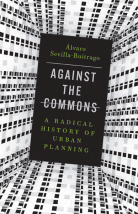Against the Commons: A Radical History of Urban Planning

Against the Commons: A Radical History of Urban Planning by Álvaro Sevilla-Buitrago begins by suggesting that the commons has become not only an elusive, but also an imaginary concept within urbanization. Through his book, Sevilla-Buitrago seeks to challenge metanarratives within the fields of planning history and theory in addition to advancing discussions in the critical social sciences by engaging with the urban question and role of spatial politics. In the author’s own words, “This book … takes up the task on understanding planning as an intrinsic element of spatial reproductive fixes under capitalism” and examines the past to inform how we build democratic urban futures.
Against the Commons draws attention to the sparsely studied negative agency of urban planning and capitalist urbanization in the demise of achieving improvements associated with the commons, such as collectivization of society and creation of communal space. It also highlights the lack of attention to the spatial or geographical element in either created or destroying communal formations.
Using this heuristic category of the commons, Sevilla-Buitrago aims to fill these knowledge gaps by examining the role of spatial planning in the varying stages of capitalism and to offer an alternative planning genealogy. Here he surveys urbanization and planning “as essential sites and stakes of broader social struggles … [and] … understands the project of planning as a constituent part of a larger systemic imperative” of building a coherent social basis which itself undermines through its own destabilizing forces.
The Introduction of Against the Commons explores planning as historical project, emphasizes the critical-theoretical apparatus and elaborates upon the concept that planning has reinforced capitalist goals and, in the process, undermined the commons. The pursuing four chapters individually scrutinise Western experiences in four different cities and regions: 1) the English hinterlands, 2) New York and Chicago, 3) Berlin, and 4) Milan. Chosen for their proximity to capitalist progression, the author highlights key problematics at transitional historical stages during the shift to modern capitalist urbanization and new planning paradigms. Set in the eighteenth-century hinterlands of England, Chapter 1 traces planning’s roots back to processes of privatization that aided the industrial revolution through the “enclosure of common land and the elimination of common rights”. The examples in Chapters 2 and 3 are closer to the traditional rules of planning and are used to elucidate how the commons can be eroded through the mobilization of state-promoted regimes of publicity. Drawing upon the movement called Autonomia, Chapter 4 begins by exploring the challenges around the commons of creativity; the second half explores the case of urban neoliberalization in Milan and the transformation of planning to embrace the creative city paradigm.
In his conclusion, Sevilla-Buitrago reiterates the often-contradictory tension between planning and the commons within capitalist urban systems, and explores potential, commons-based urbanization futures.
Book Note prepared by Hannah Keren Lee.
Search the Book notes database
Our Book notes database contains details and summaries of all the publications included in Book notes since 1993 - with details on how to obtain/download.
Use the search form above, or visit the Book notes landing page for more options and latest content.
For a searchable database for papers in Environment and Urbanization, go to http://eau.sagepub.com/

